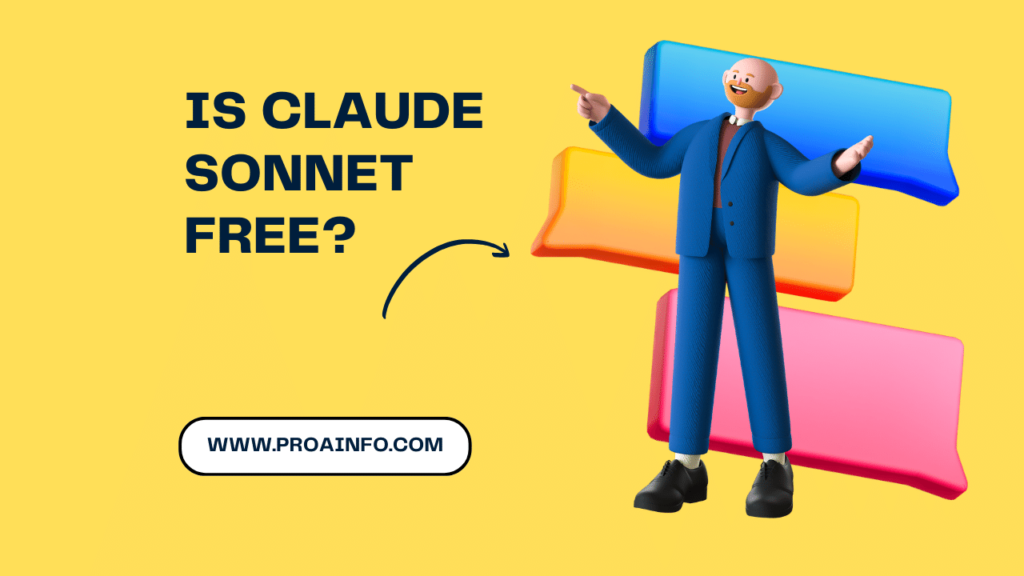Is Claude Sonnet free? In the rapidly evolving landscape of artificial intelligence (AI), one name that has garnered significant attention is Claude Sonnet. Developed by the renowned AI research company Anthropic, Claude Sonnet is an advanced language model that promises to revolutionize the way we interact with and utilize AI.
However, amidst the excitement surrounding this cutting-edge technology, a burning question arises: Is Claude Sonnet truly free, or are there hidden costs and implications that users should be aware of? This article delves into the intricacies of Claude Sonnet, examining its purported “free” nature and exploring the various factors that may influence its accessibility and usage.
The Rise of Claude Sonnet
Before diving into the heart of the matter, it is essential to understand the context surrounding Claude Sonnet’s emergence. Anthropic, the company behind this innovative AI model, has long been at the forefront of AI research, dedicated to developing advanced language models that can engage in natural language interactions with humans.
Claude Sonnet represents a significant leap forward in this endeavor, boasting impressive language understanding and generation capabilities. Its ability to comprehend and respond to complex prompts, engage in creative writing, and even tackle coding challenges has captivated the attention of developers, researchers, and tech enthusiasts alike.
The Promise of “Free” AI

One of the most alluring aspects of Claude Sonnet is Anthropic’s claim that it is a “free” AI model. In an era where cutting-edge technologies often come with exorbitant price tags, the notion of a powerful AI tool being freely accessible is undoubtedly enticing. However, the concept of “free” is a nuanced one, and it is crucial to understand what Anthropic truly means by this term.
Anthropic’s Stance on “Free”
According to Anthropic’s official statements, Claude Sonnet is indeed free to use for individuals and non-commercial purposes.
This means that developers, researchers, and hobbyists can leverage the power of this AI model without incurring any upfront costs or subscription fees. Anthropic’s motivation behind this decision is to democratize access to advanced AI technology, fostering innovation and encouraging widespread experimentation.
However, it is important to note that while the model itself may be free, there are certain limitations and caveats that users should be aware of.
Limitations and Caveats
- Commercial Usage Restrictions
While Claude Sonnet is free for non-commercial purposes, Anthropic has explicitly stated that commercial usage requires obtaining a license and potentially paying fees. This distinction is crucial for businesses or individuals looking to integrate Claude Sonnet into commercial products or services. - Computational Resources
While the model itself may be free, running it requires significant computational resources, which can be costly. Users may need to invest in powerful hardware or cloud computing services to effectively utilize Claude Sonnet, especially for resource-intensive tasks or large-scale deployments. - Data Privacy and Security Considerations
As with any AI model, there are potential concerns regarding data privacy and security. Users should be mindful of the data they feed into Claude Sonnet and ensure that sensitive or proprietary information is properly protected. - Ethical and Responsible Use
Anthropic has emphasized the importance of ethical and responsible use of Claude Sonnet. Users are expected to adhere to guidelines and best practices to prevent misuse, bias, or harmful outputs from the AI model.
The Hidden Costs of “Free” AI

While Anthropic’s decision to make Claude Sonnet free for non-commercial use is laudable, it is crucial to recognize that “free” does not necessarily mean without costs or implications. In fact, there are several hidden costs and considerations that users should be aware of.
- Opportunity Costs
Even though Claude Sonnet itself may be free, the time and effort required to integrate, fine-tune, and maintain the AI model can be substantial. Developers and researchers may need to divert resources from other projects or initiatives, potentially incurring opportunity costs. - Dependency and Lock-In
By adopting Claude Sonnet, users may become reliant on Anthropic’s technology stack, potentially leading to vendor lock-in. This could make it challenging to switch to alternative solutions in the future, should the need arise. - Ongoing Support and Updates
AI models like Claude Sonnet require continuous updates and improvements to stay relevant and perform optimally. While Anthropic may provide free updates initially, there is no guarantee that this will continue indefinitely, potentially leading to additional costs down the line. - Ethical and Societal Implications
The widespread adoption of powerful AI models like Claude Sonnet raises important ethical and societal questions. While the technology itself may be free, the potential consequences of its misuse or unintended consequences could be far-reaching and costly for society as a whole.
Assessing the True Value of Claude Sonnet
While the “free” nature of Claude Sonnet is undoubtedly appealing, it is essential to evaluate its true value and potential impact holistically. Several factors should be considered when assessing the worth of this AI model.
- Performance and Capabilities
Ultimately, the value of Claude Sonnet lies in its performance and capabilities. If the AI model can deliver exceptional results, streamline processes, and drive innovation, its impact could outweigh any potential hidden costs or considerations. - Ease of Integration and Use
The accessibility and ease of integration of Claude Sonnet are crucial factors in determining its true value. If the model can be seamlessly integrated into existing workflows and utilized without significant barriers, its adoption and impact could be amplified. - Scalability and Flexibility
As projects and requirements evolve, the scalability and flexibility of Claude Sonnet become essential. An AI model that can adapt to changing needs and scale effortlessly will provide greater long-term value than one with rigid limitations. - Community Support and Ecosystem
The strength of the community surrounding Claude Sonnet, including resources, documentation, and third-party tools, can significantly enhance its value. A vibrant ecosystem can accelerate development, troubleshooting, and the sharing of best practices. - Ethical Alignment and Responsible Use
In the age of AI, ethical considerations and responsible use are paramount. An AI model that prioritizes ethical principles, transparency, and accountability can provide inherent value by mitigating potential risks and fostering trust among users and stakeholders.
Striking the Right Balance
Ultimately, the question of whether Claude Sonnet is truly free is a multifaceted one that requires a balanced and nuanced approach. While Anthropic’s decision to offer the AI model for free in certain contexts is commendable, it is essential to recognize the potential hidden costs, limitations, and implications associated with its adoption and use.
Striking the right balance involves carefully weighing the benefits of Claude Sonnet against the potential trade-offs and considerations. By doing so, users can make informed decisions about whether the “free” nature of the AI model aligns with their specific needs, resources, and long-term goals.
Conclusion
In conclusion, the question “Is Claude Sonnet free?” is not a simple yes or no answer. While Anthropic’s commitment to democratizing access to advanced AI technology is laudable, the true value and implications of Claude Sonnet extend beyond its upfront cost.
Users must carefully evaluate the potential hidden costs, limitations, and ethical considerations associated with adopting this AI model. Additionally, they should weigh the long-term value and impact of Claude Sonnet against their specific requirements and resources.
Ultimately, the decision to embrace Claude Sonnet should be based on a holistic assessment of its performance, capabilities, ease of use, scalability, and alignment with ethical principles. By striking the right balance, individuals and organizations can leverage the power of this innovative AI technology while mitigating potential risks and maximizing its positive impact.
In the rapidly evolving world of AI, the question of “free” is not merely about upfront costs but about the overall value proposition and responsible stewardship of these powerful technologies. As we navigate this exciting yet complex landscape, it is crucial to approach such questions with a critical and nuanced mindset, ensuring that the pursuit of innovation is balanced with ethical considerations and long-term sustainability.
FAQs
What is Claude Sonnet?
Claude Sonnet is an advanced language model developed by Anthropic, a leading AI research company. It is designed to engage in natural language interactions, tackle complex tasks, and assist with a wide range of applications.
Is Claude Sonnet truly free to use?
According to Anthropic, Claude Sonnet is free for non-commercial use by individuals and researchers. However, commercial usage requires obtaining a license and potentially paying fees.
Are there any limitations or caveats to the “free” usage of Claude Sonnet?
Yes, there are several limitations and caveats to consider. These include restrictions on commercial usage, the need for computational resources, data privacy and security concerns, and the importance of ethical and responsible use.
What are the potential hidden costs associated with using Claude Sonnet?
Some hidden costs may include opportunity costs (time and effort required for integration and maintenance), dependency and vendor lock-in, ongoing support and updates, and the ethical and societal implications of AI adoption.
How does Claude Sonnet’s performance and capabilities factor into its value?
The true value of Claude Sonnet lies in its ability to deliver exceptional results, streamline processes, and drive innovation. Its performance and capabilities are crucial factors in determining its overall worth.
What role does ease of integration and use play in assessing Claude Sonnet’s value?
The accessibility and ease of integration of Claude Sonnet are essential factors. If the model can be seamlessly integrated into existing workflows and utilized without significant barriers, its adoption and impact could be amplified.
Why is scalability and flexibility important when evaluating Claude Sonnet?
Scalability and flexibility are crucial as projects and requirements evolve. An AI model that can adapt to changing needs and scale effortlessly will provide greater long-term value than one with rigid limitations.
How can a strong community and ecosystem enhance Claude Sonnet’s value?
A vibrant community surrounding Claude Sonnet, including resources, documentation, and third-party tools, can significantly enhance its value by accelerating development, troubleshooting, and the sharing of best practices.
What are the ethical considerations surrounding the use of Claude Sonnet?
Ethical considerations and responsible use are paramount in the age of AI. An AI model that prioritizes ethical principles, transparency, and accountability can provide inherent value by mitigating potential risks and fostering trust among users and stakeholders.







